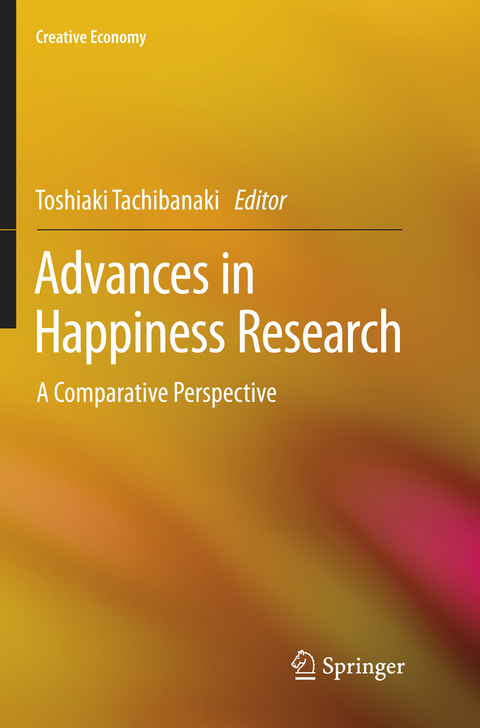
Advances in Happiness Research
Springer Verlag, Japan
978-4-431-56687-8 (ISBN)
Editor Tachibanaki, Toshiaki is a professor in Faculty of Economics at Doshisha University and the Director of the Life Risk Research Center. He holds a Ph.D. in Economics, awarded by The Johns Hopkins University in 1973. He has held teaching and research positions at INSEE, OECD, Osaka University, Kyoto University, Stanford University, University of Essex, London School of Economics. He has also served as a director of research groups in the Economic Planning Agency, Bank of Japan, Ministry for Posts and Telecommunication, Ministry of Finance, and Ministry of International Trade and Industry. His research interests cover labor economics, public and financial economics, applied econometrics, economic theory and the Japanese economy. He is the author of many books including those written in English such as “Capital and Labour in Japan: The Functions of Two Factor Markets” (2012), “The New Paradox for Japanese Women: Greater Choice, Greater Inequality” (2010), “Confronting Income Inequality in Japan: A Comparative Analysis of Causes, Consequences, and Reform” (2009). He has published extensively in journals such as International Economic Review, Review of Economics and Statistics, Journal of Public Economics, Nihon Rodo Kyokai Zasshi, European Economic Review and Financial Review.
1 Introduction.- Part I: Issues in Happiness Research—Concepts, Measurement and Interpretation.- 2 Happiness: Research and Policy Considerations (Bruno Frey and Jana Gallus).- 3 The ‘Wicked Problem’ of Wellbeing: Theorising the Prospects for Policy Change (Ian Bache and Louise Reardon).- 4 An Overview of Intertemporal Measures of Individual Well-being: Can They Explain Life Satisfaction Better? (Conchita D'Ambrosio).- 5 The Importance of ‘Domain Importance’ for Happiness Economics (Tim Tiefenbach and Florian Kohlbacher).- 6 Adaptation and the Easterlin Paradox (Andrew Clark).- Part II: Income Inequality, Employment, and Happiness.- 7 Comparative Study of Happiness and Inequality in Five Industrialized Countries (Toshiaki Tachibanaki and Sayaka Sakoda).- 8 Happiness, Social Cohesion and Income Inequalities in Britain and Japan (Dimitris Ballas, Danny Dorling, Tomoki Nakaya, Helena Tunstall, Kazumasa Hanaoka and Tomoya Hanibuchi).- 9 Happiness and Employment Status (Tadashi Yagi, Katsuhiko Yonezaki and Kunio Urakawa).- 10 The Impact of Employment System on Feeling of Happiness in Germany and Japan (Toshiyuki Shirakawa).- 11 Effects of Paid and Unpaid Overtime Work on Stress, Earnings and Happiness (Akira Kawaguchi and Takato Kasai).- Part III: Societal Issues and Happiness.- 12 Why Do Japanese Parents and Their Young Adult Children Live Together? (Kei Sakata and C.R. McKenzie).- 13 Anticipation of Life Satisfaction before Emigration Evidence from German Panel Data (Marcel Erlinghagen).- 14 Does City Size affect Happiness? (Yoshio Itaba).- 15 Can Work-Life Balance Policies Foster Happiness within the Family?A Comparison of Traditional versus New Family Arrangements (Álvaro Martínez-Pérez).- 16 Accessing Suicidal Ideation fromResponses to Queries on Subjective Well-being (Susumu Kuwahara, Teruyuki Tamura, Akiko Kamesaka and Toshiya Murai).- 17 Do the Arts and Culture Have a Positive Impact on Happiness? Beyond Methodological Issues (Nobuko Kawashima).- 18 Arts and Happiness (Lasse Steiner).
| Erscheinungsdatum | 17.06.2018 |
|---|---|
| Reihe/Serie | Creative Economy |
| Zusatzinfo | 21 Illustrations, color; 17 Illustrations, black and white; XX, 344 p. 38 illus., 21 illus. in color. |
| Verlagsort | Tokyo |
| Sprache | englisch |
| Maße | 155 x 235 mm |
| Themenwelt | Studium ► Querschnittsbereiche ► Prävention / Gesundheitsförderung |
| Wirtschaft ► Betriebswirtschaft / Management ► Planung / Organisation | |
| Wirtschaft ► Volkswirtschaftslehre ► Mikroökonomie | |
| ISBN-10 | 4-431-56687-2 / 4431566872 |
| ISBN-13 | 978-4-431-56687-8 / 9784431566878 |
| Zustand | Neuware |
| Haben Sie eine Frage zum Produkt? |
aus dem Bereich


